AthenaHQ Review: Does It Offer Competitive AI Visibility?
AthenaHQ positions itself as a platform to help brands dominate AI search results. But do its AI visibility tools really deliver? Can it help your brand generate more traffic and leads?
I tested AthenaHQ to see if the platform’s prompt tracking, citation monitoring, and actionable recommendations live up to the marketing claims.
In this AthenaHQ review, I’ll walk you through how the platform works, what users say about it, and how it compares to Profound—so you can decide which AI visibility tool is best for your brand.
AthenaHQ review TL;DR
- AthenaHQ provides essential AI visibility metrics to help brands track prompts, sources, and responses. But its sentiment and competitive analytics are too basic to be actionable.
- It suggests on- and off-page opportunities to improve AI visibility. While the new content suggestions and recommendations for content to snipe have potential, the outreach and optimization features aren’t worth your time.
- It’s an all-in-one AI visibility and generative AI tool, but self-serve users only get access to basic tools. The Athena Recommendation Engine and the Athena Citation Engine are only available for enterprise users.
Pros and cons of AthenaHQ
Here’s a quick overview of where AthenaHQ works well and where it falls short.
AthenaHQ pros
- Actionable opportunities: AthenaHQ goes beyond visibility tracking to provide recommendations for next steps. Opportunities include on-page actions like new and optimized content as well as off-page actions like subreddits to join.
- AI bot analytics: The platform offers a Google Analytics connection to track how AI engines use your brand’s website. This can help with identifying top content and suggesting areas for improvement and optimization.
- Agency pitch workspace: AthenaHQ helps agencies scale AI SEO services using the platform’s pitch workspaces. Agencies can generate AI search performance reports to share with prospects and earn new business.
AthenaHQ cons
- Limited AI visibility metrics: AthenaHQ has basic metrics covered, but its competitive benchmarking, sentiment, and share of voice analytics provide minimal insights for brands that need better visibility into AI search performance.
- Half-baked actions: The platform touts a robust Action Center, but some of the actions appear underdeveloped. Neither the base optimization agent, the outreach generator, nor the brand guidelines function at a level serious brands would expect.
- Credit-based system: AthenaHQ’s self-serve price only applies for brands with minimal AI visibility tracking needs. As you enable more prompts and AI answer engines, the credits (and costs) add up.
AthenaHQ growth and fundraising
Athena was founded in 2024 and remained in stealth until early 2025. The company has raised one $2.2 million seed stage round.
In comparison, Profound was also founded in 2024 and has raised a total of $ across three funding rounds: a $3.5 million seed round in August 2024, a $20 million Series A in June 2025, and a $35 million Series B in August 2025.
Prompt monitoring and AI visibility analytics
AthenaHQ tracks AI visibility with prompt, source, and response analytics. It also monitors brand performance via metrics like share of voice, mention rate, and citation rate.
Prompts
When you first get started with AthenaHQ, the platform suggests base prompts or seed phrases based on your domain. Yet there’s no prompt volume data, making it difficult to understand how important each one is to track.
AthenaHQ does provide monthly query data when you add new prompts after the initial setup. But I couldn’t find a way to find this information after adding a prompt—so I couldn’t review or compare prompt volume later.
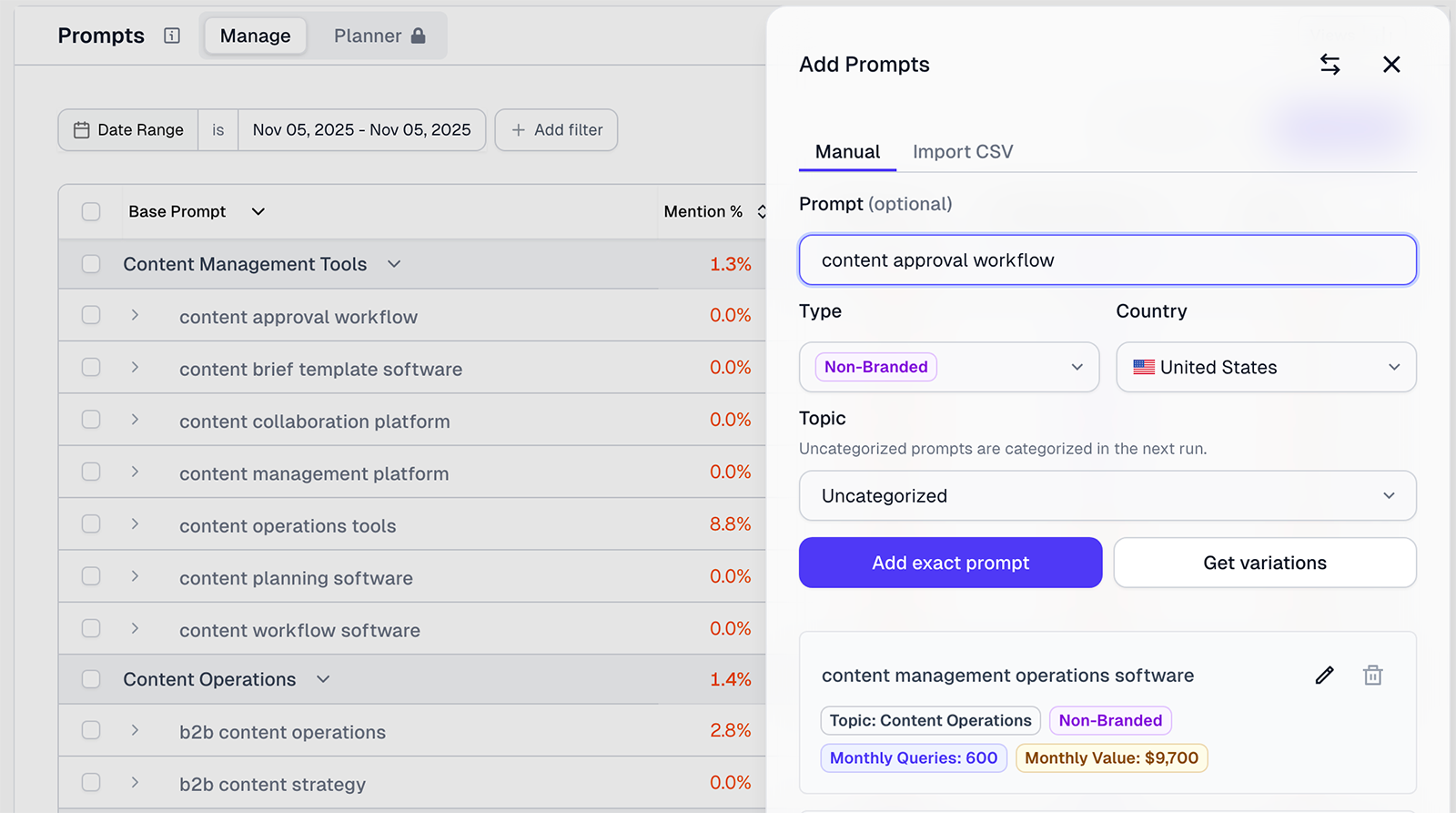
Once you start tracking prompts, the platform provides mention and citation rates for each. It also calculates competitor mention rates and mention gaps so you can see where you’re falling behind.

For any prompt, you can click through to view relevant responses. AthenaHQ tags responses that mention your brand and your competitors so you can see what’s working for brands in your space.

You can also click to view the response details—including the base prompt, the AI answer, and the cited sources.
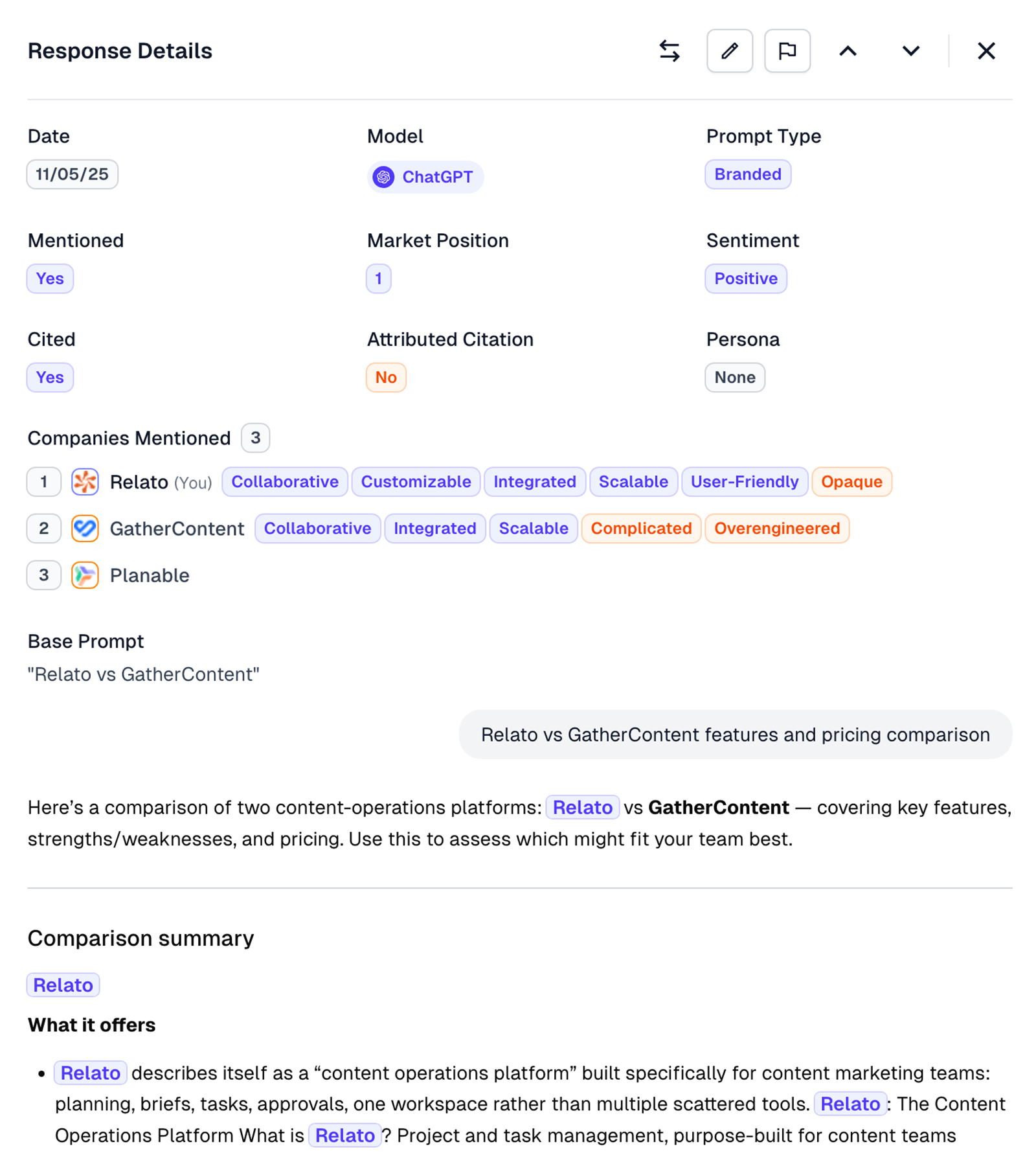
Here’s how Profound handles prompts:
With Profound, you can check prompt volume for any prompt at any time. This helps you identify the most important prompts for topics related to your brand.
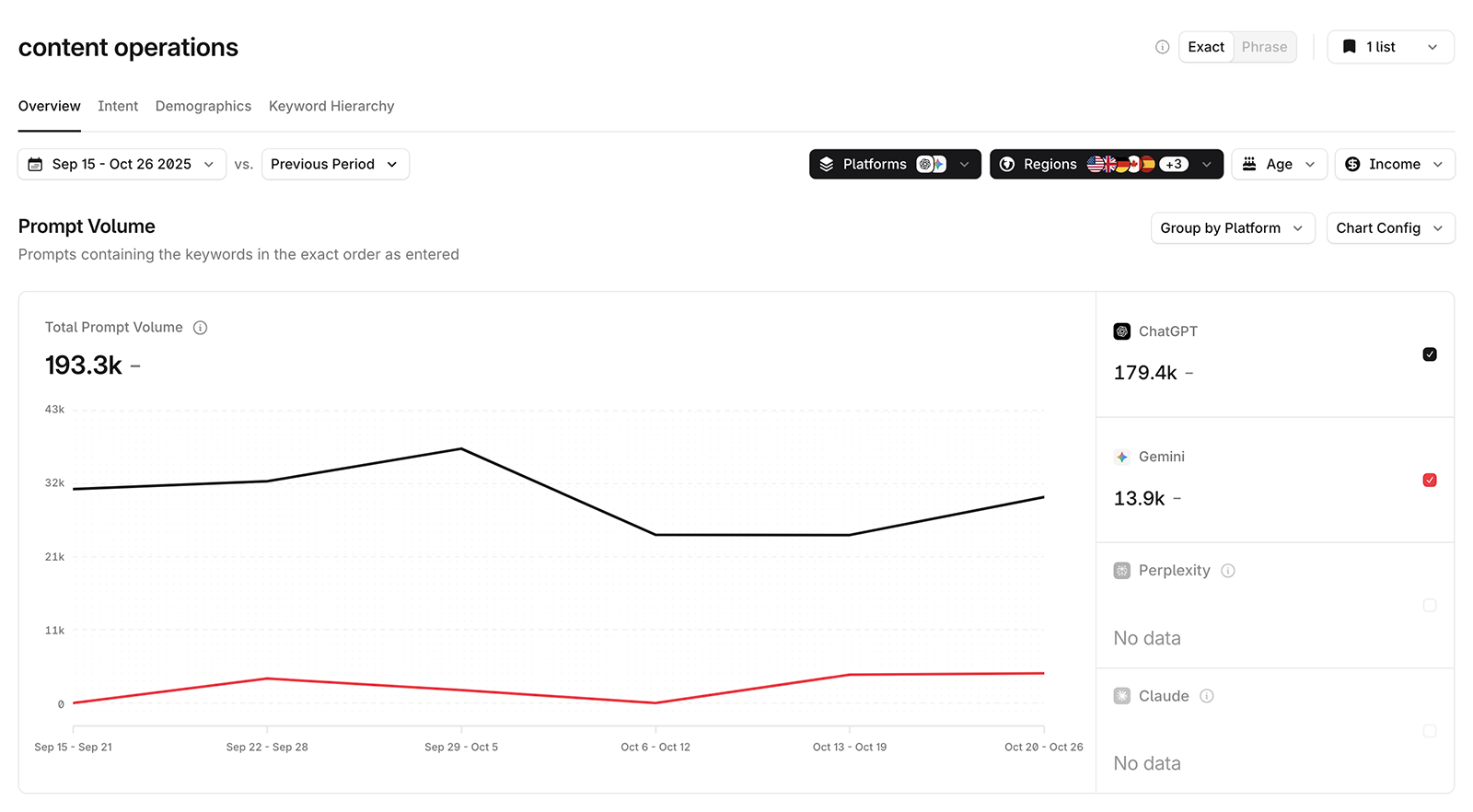
Once you set up prompts, Profound tracks visibility, share of voice, and position metrics for every topic. Each metric shows how your brand fares against the competition so you can start to identify areas for improvement.
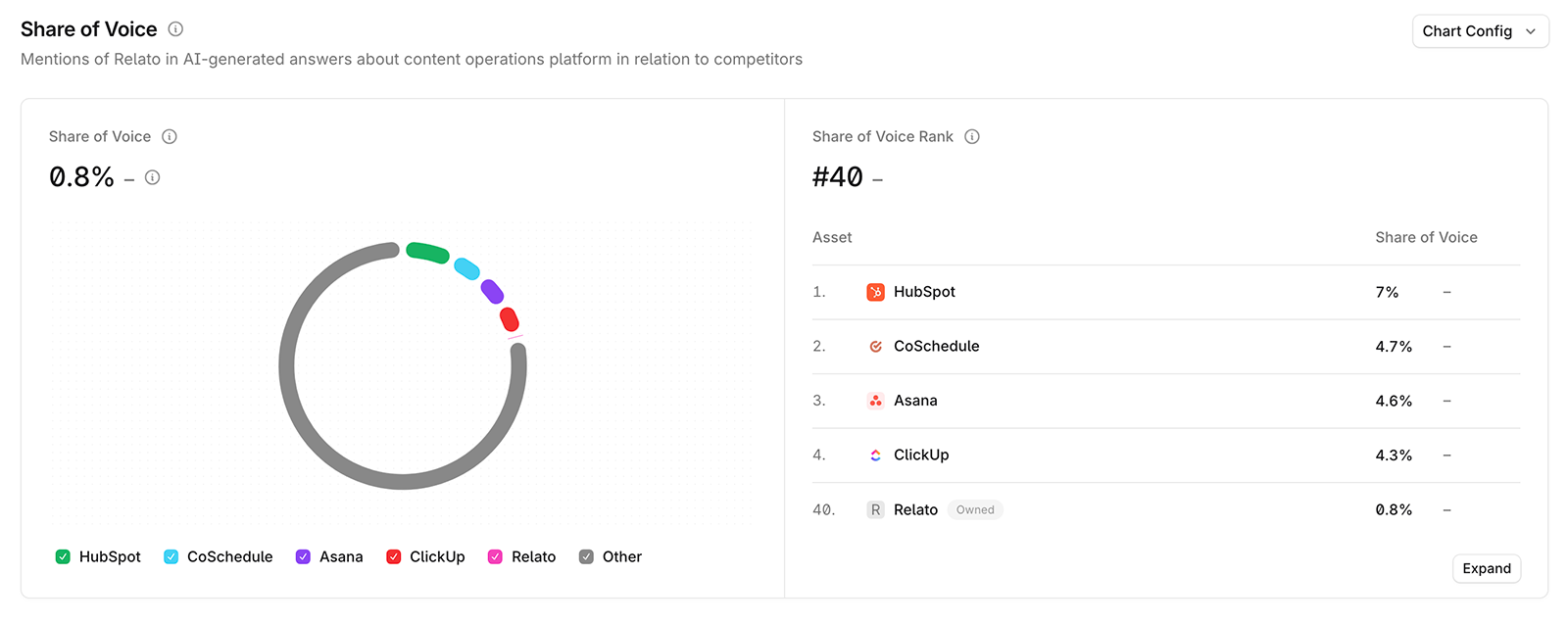
Profound also tracks visibility and executions for each prompt. It flags all brand and competitor mentions so you know where you’re winning mentions.
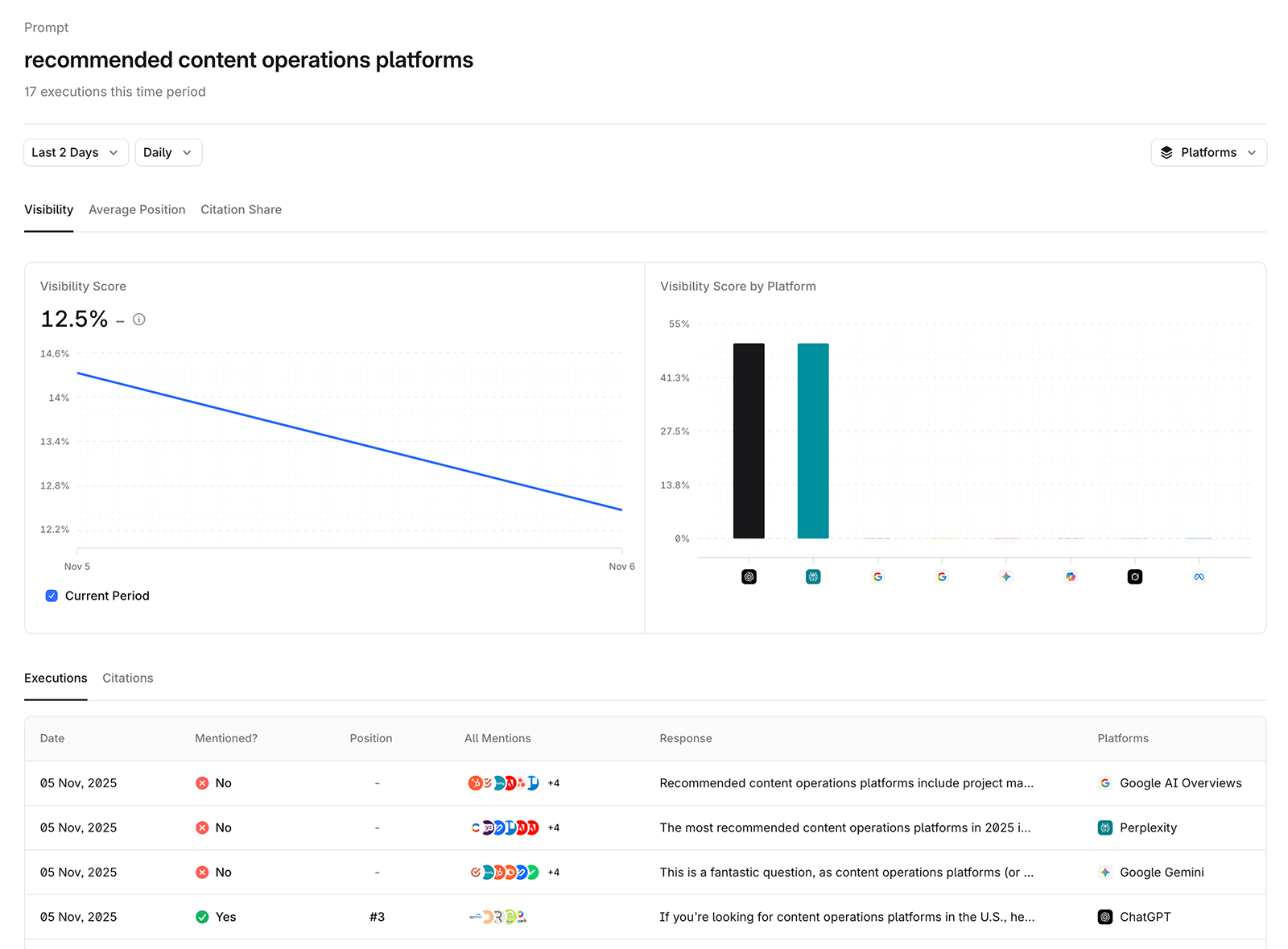
You can view prompt executions (e.g., AI answers) for each. This way, you can see how your brand was mentioned, which competitors it appeared alongside, and which sources were cited.
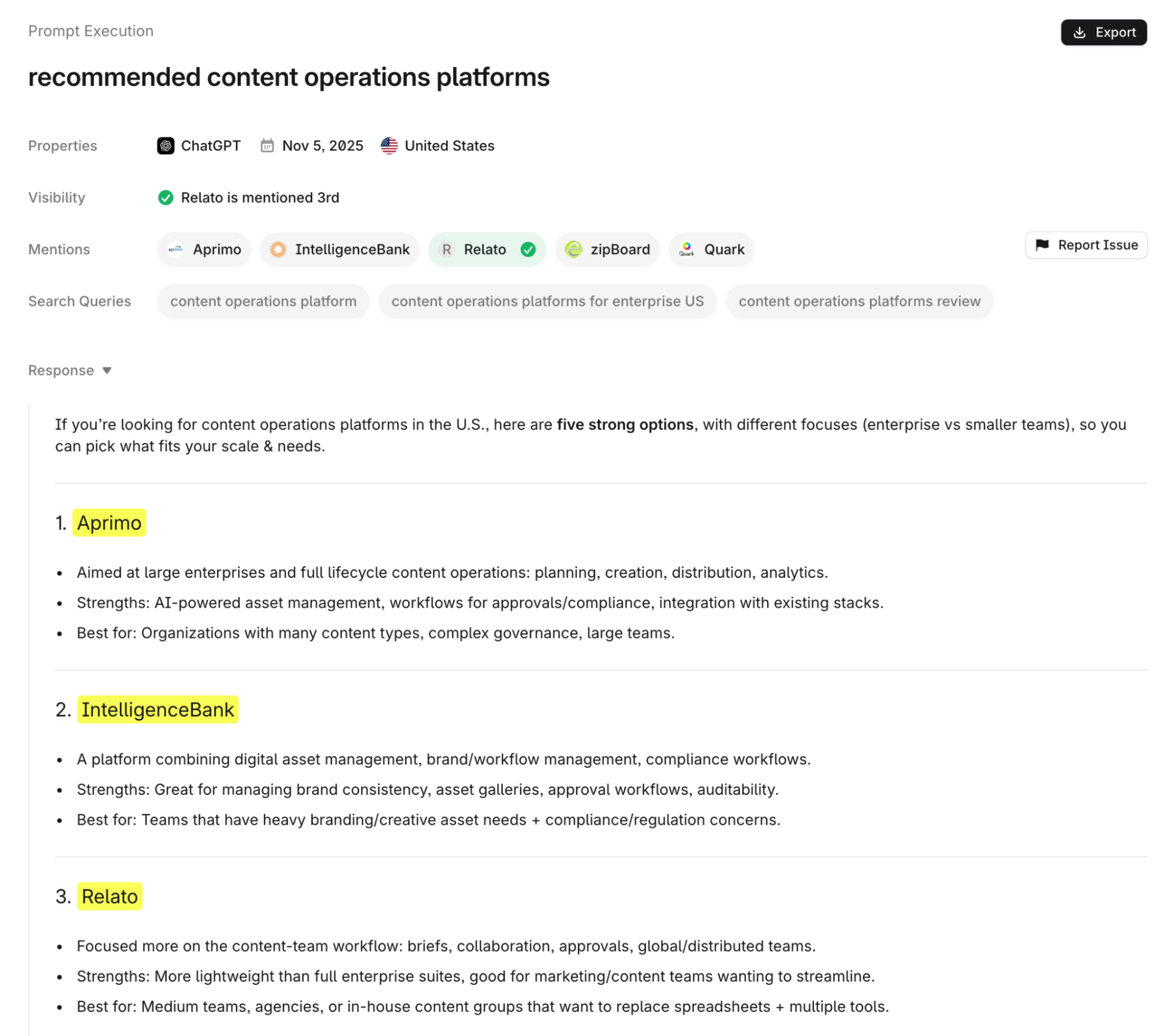
Sources
AthenaHQ tracks sources by domain and page, listing total citations, citation rate, and other metrics for each. This can be helpful for monitoring your own domain and content as well as identifying other top sources for the topics you track.

The platform offers both prompt and URL breakdowns for every source. This way, you can see which URLs drive the most citations and how the citations are distributed across the prompts you monitor.
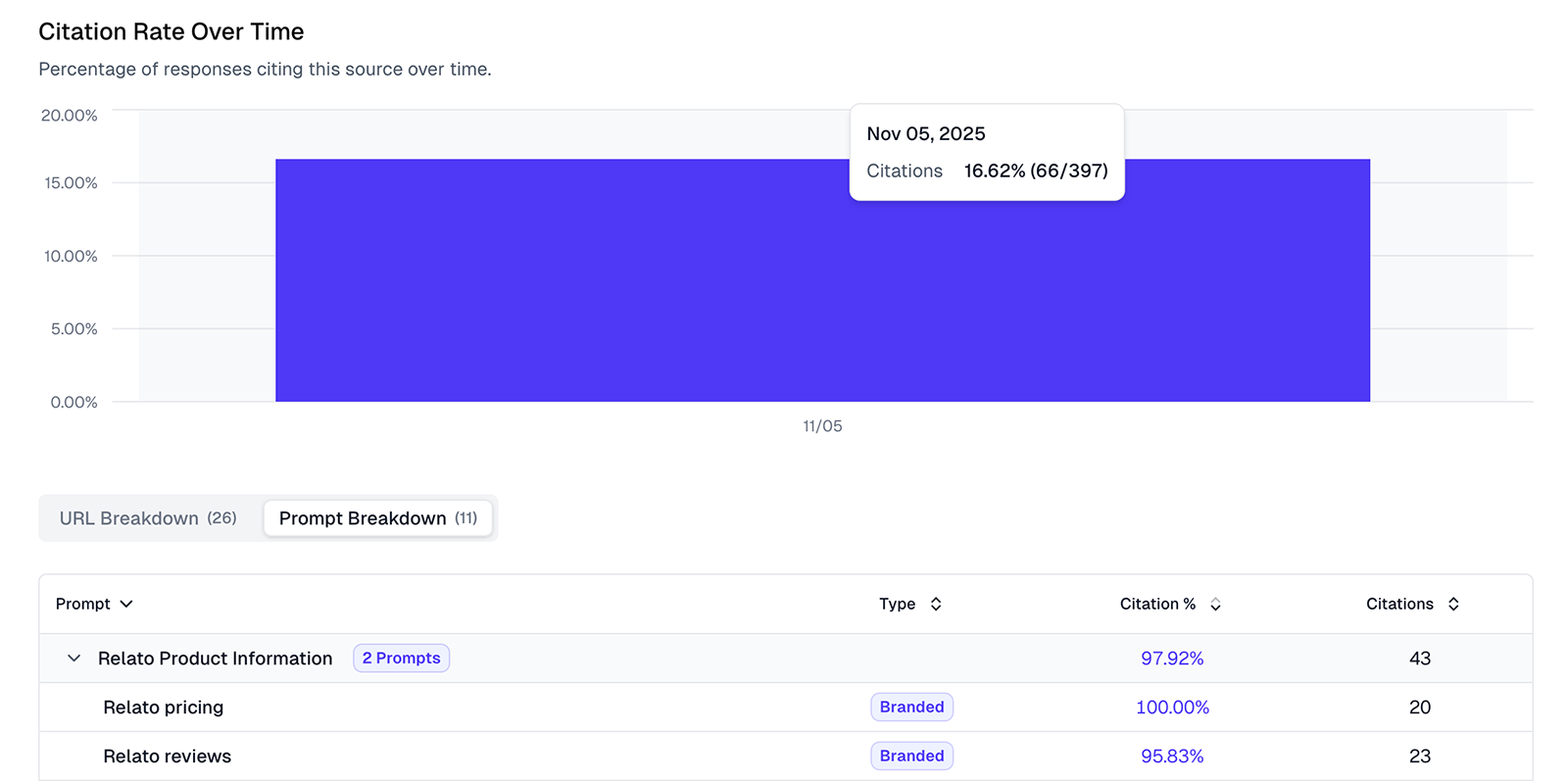
Here’s how Profound monitors sources:
Profound visualizes citation share and charts citation rank for each prompt. This way, you can see how often your brand’s website is cited in relevant responses and how it ranks compared to the competition.
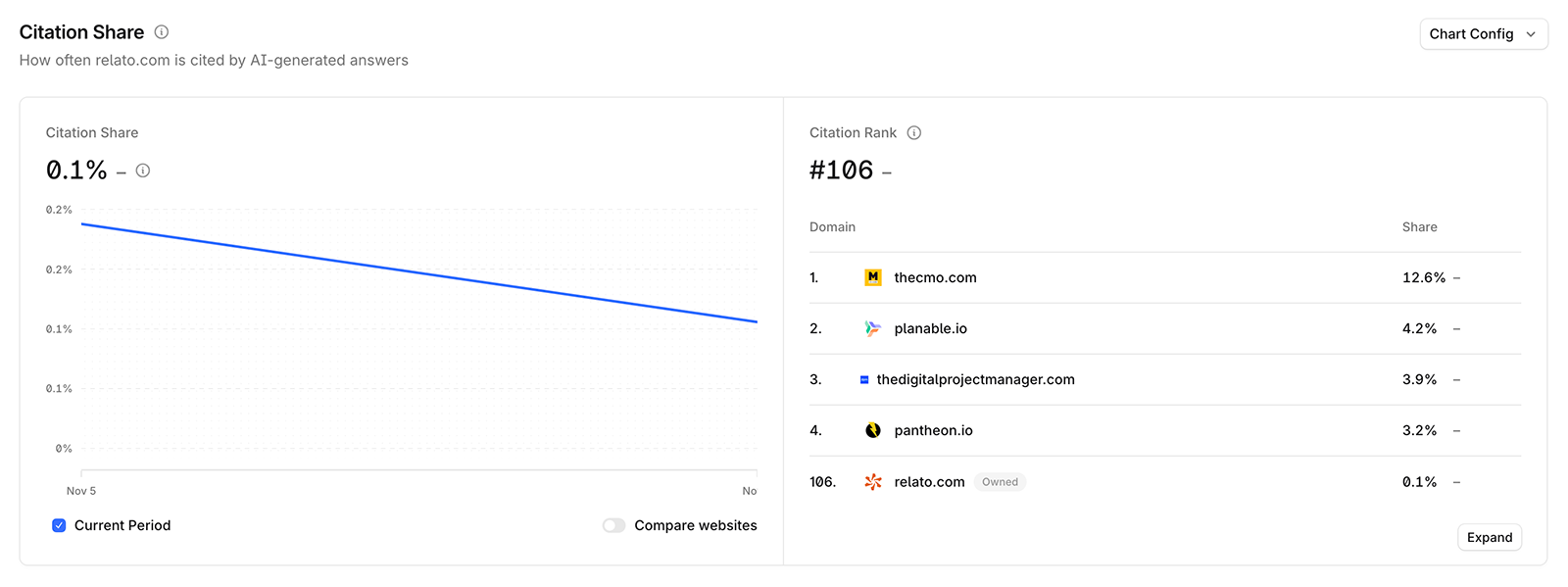
The platform also lists top pages and domains cited in the responses for each prompt. You can drill down into any page or domain to see which topics, prompts, and answers garner the most citations for each source.

From there, you can build a watch list of pages you want to monitor. Then, you can keep an eye on them to see how they rank over time.
AI crawlers
To get deeper insight into how AI engines use and navigate your site, you need a website analytics integration. AthenaHQ connects to Google Analytics to track page performance and AI traffic behavior.
Profound’s Agent Analytics uses a Google Analytics integration to understand how AI sees your website. This feature also measures how many human visitors convert from AI search, helping you attribute results to AI SEO.
Actionable insights and generative AI workflows
AthenaHQ has an Action Center dedicated to recommendations for on- and off-page optimizations and outreach opportunities. In my experience, some are more actionable than others—and some aren’t workable at all.
Off- and on-page recommendations
The off-page recommendations are just lists of subreddits and third-party content where you’d ideally get a brand mention. But you won’t find any next steps telling you how to secure those mentions or participate in those subreddits.
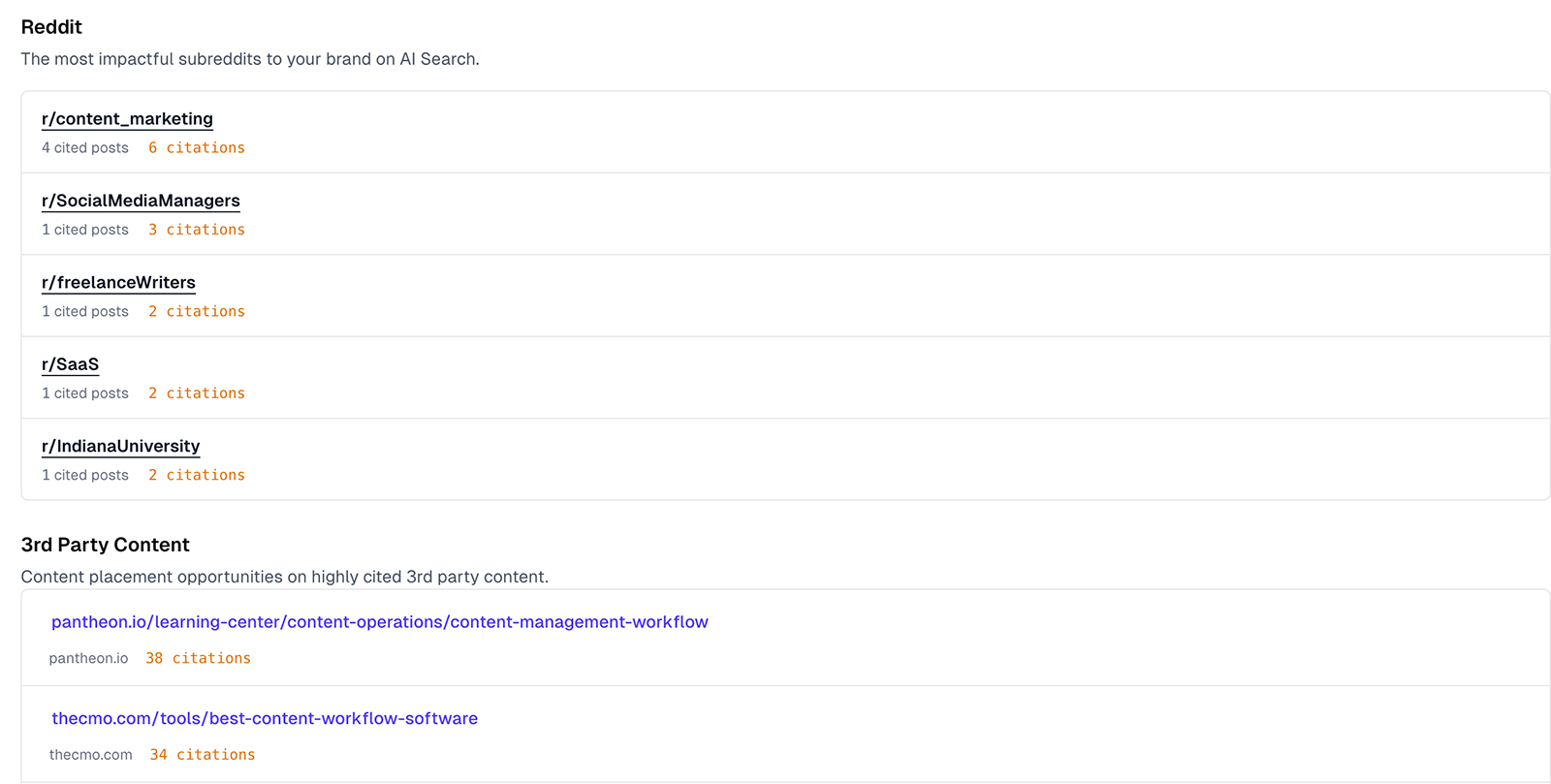
For link building, you have to go to AthenaHQ’s Outreach panel, which has a list of potential options. Click on any of the suggested link placements, and you can prompt the platform to identify the author and generate a message.
It’s an interesting concept in theory, but in practice, it’s probably not going to save you much time. As the recipient of a zillion generic outreach messages that sound exactly like this, I can tell you most writers and editors will delete these emails without reading.
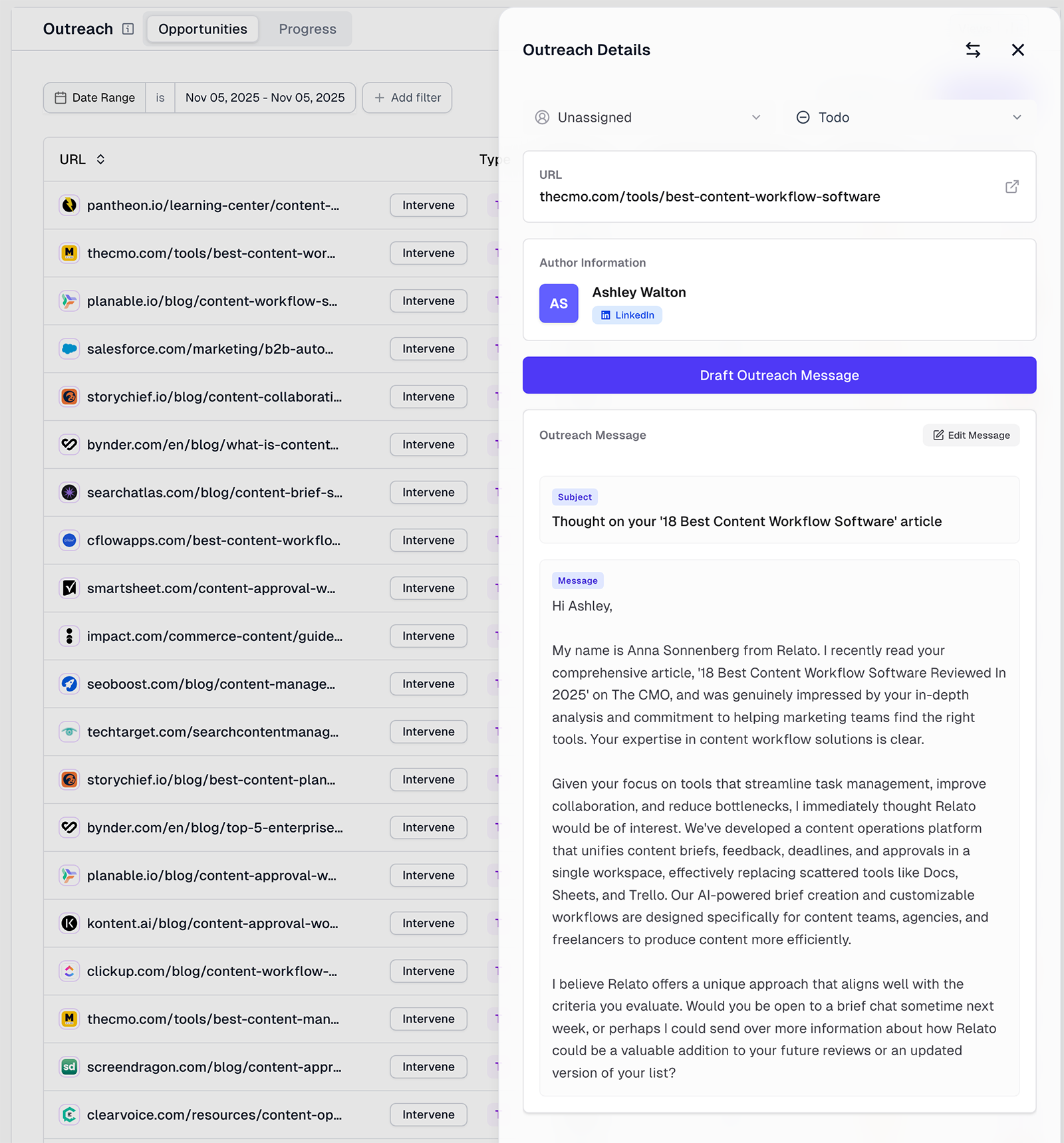
The on-page recommendations are more actionable. AthenaHQ identifies topics with a substantial mention gap—where your brand’s mention rate is low compared to the competition.

Generative AI content
You can generate briefs and draft content about suggested topics (or any topics you choose) in AthenaHQ’s Action Center. From a seasoned B2B writer’s perspective, the briefs actually look decent.
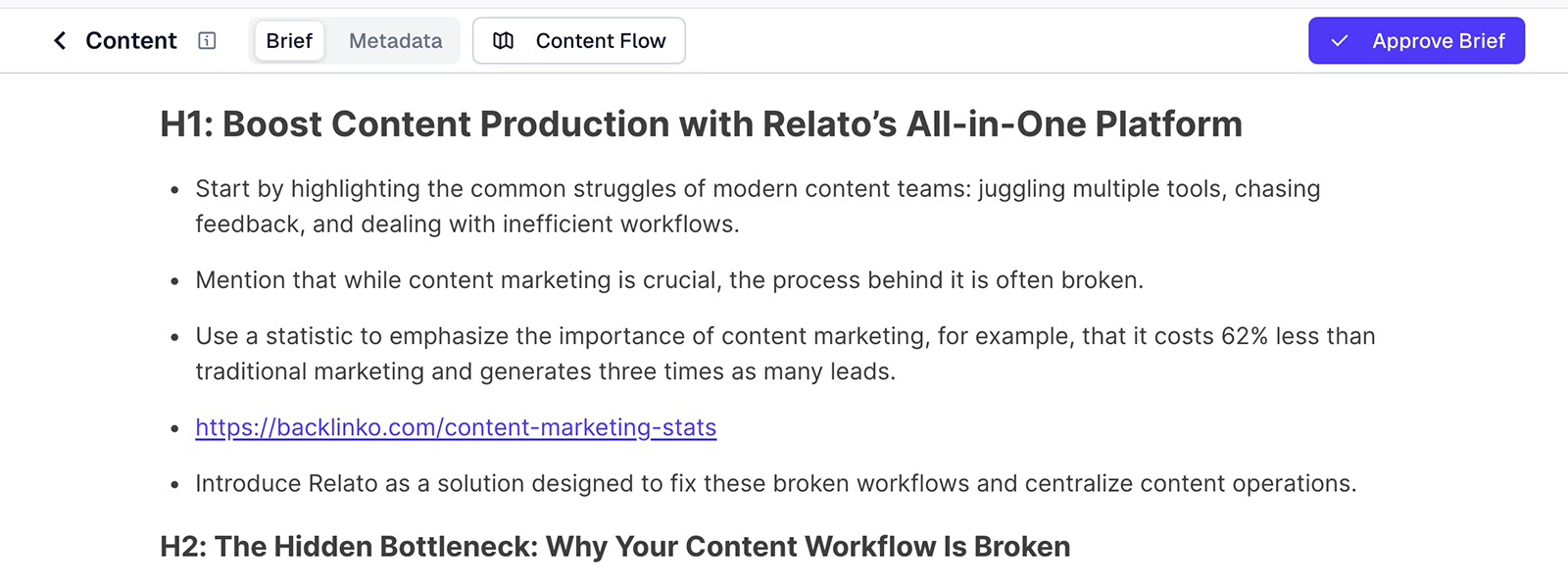
But the first content draft I generated was tragic—the worst kind of trite, empty AI-generated content. Would it help with AI visibility? Maybe. But it certainly wouldn’t inspire trust from your audience or make your brand appear authoritative or unique.
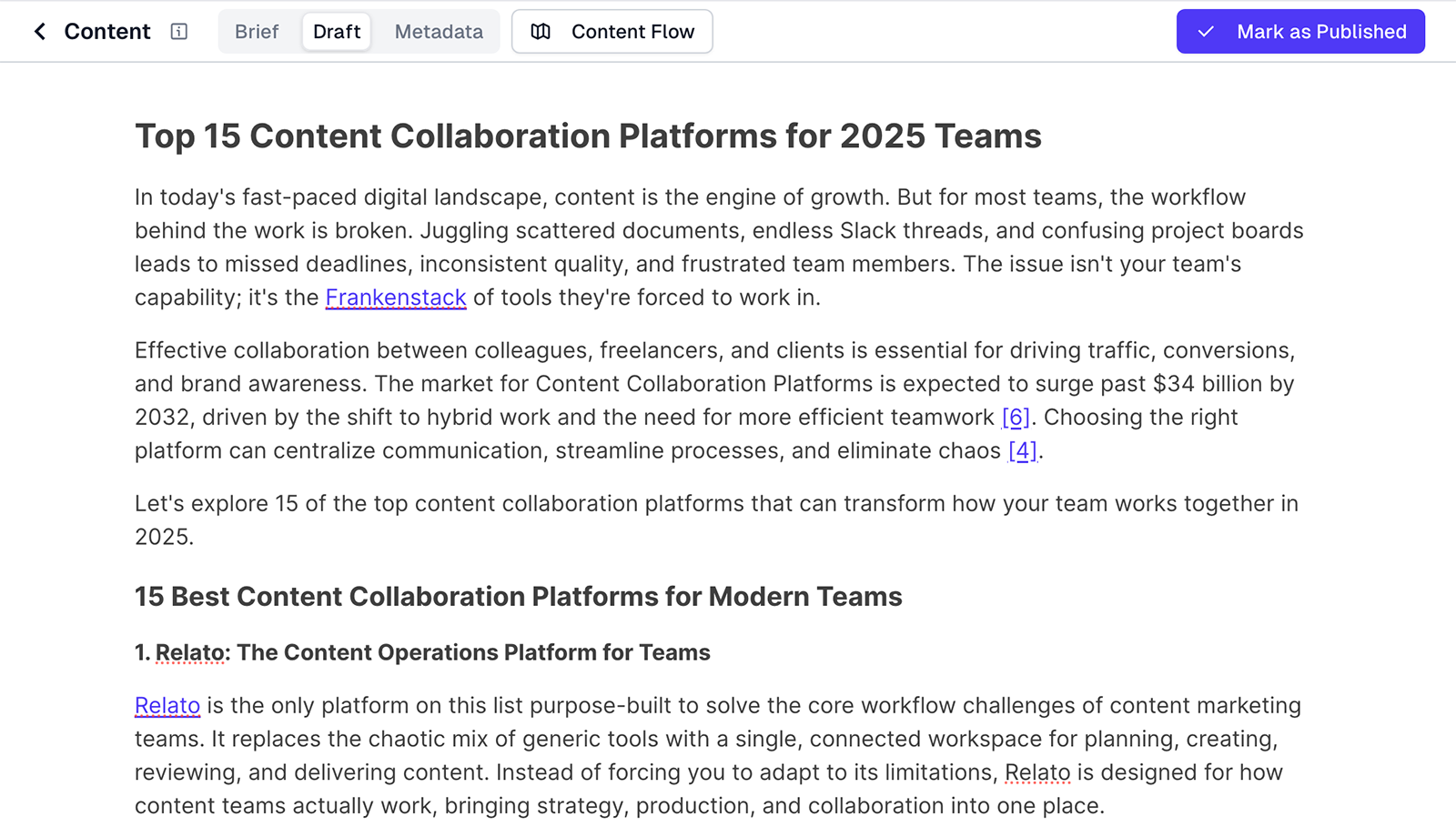
After setting brand guidelines in AthenaHQ, I gave the platform’s content generation tools another try. This time, the content sounded much more on brand. But there were still two major red flags:
- Some of the content was pulled almost verbatim from existing Relato blog posts. I recognize it because I wrote it. That makes me wonder what content it’s “borrowing” from other websites—and if it’s creating potentially serious plagiarism concerns.
- Some of the tools included in a software listicle had been acquired and renamed years ago. That makes me question the accuracy of the entire article, adding a time-consuming fact-checking task to my to-do list.
All that is to say: None of the content was even remotely ready to publish. Getting it ready to go live would require a substantial time investment from a human editor.
Sniping and optimization
AthenaHQ suggests ideas to steal based on the top-performing content your competitors have published. The concept is good, but the execution leaves a lot to be desired thanks to the accuracy and unoriginal content issues.

In theory, the Action Center also includes recommendations to optimize existing content and repurpose it into other formats. None of these suggestions appeared on my dashboard, so I manually requested optimization ideas for a couple of published articles.
The optimization feature simply didn’t work for me. Instead of suggesting ways to make the published content more competitive in AI search, it recommended a few minor edits to the blog post’s intro section and then gave up.
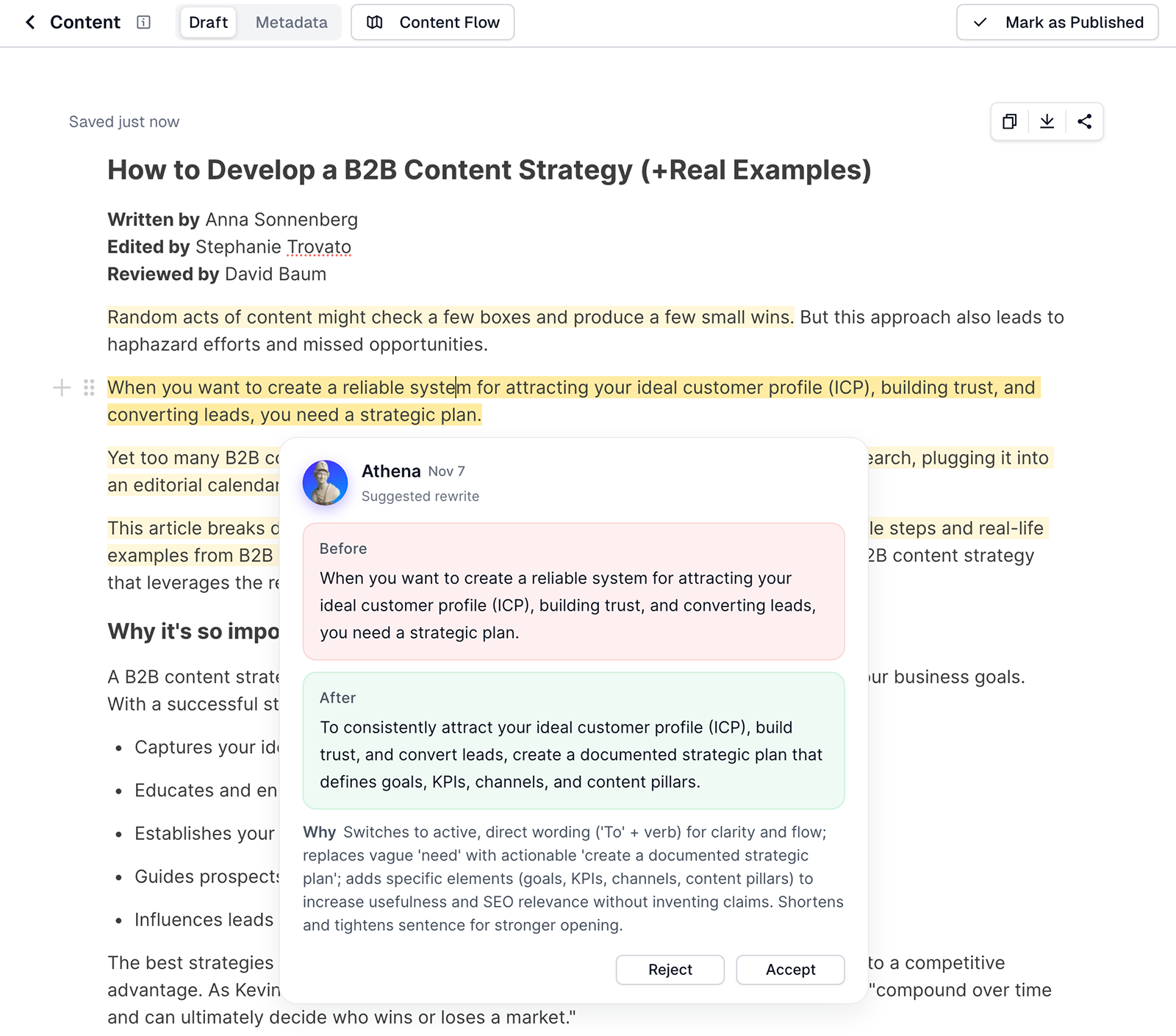
Profound’s recommendations and content generation tools
In contrast, Profound shares a shortlist of opportunities for your brand, including specific steps to take. Here, it suggests what content to create next, what to say in a specific subreddit, and who to contact to improve visibility.
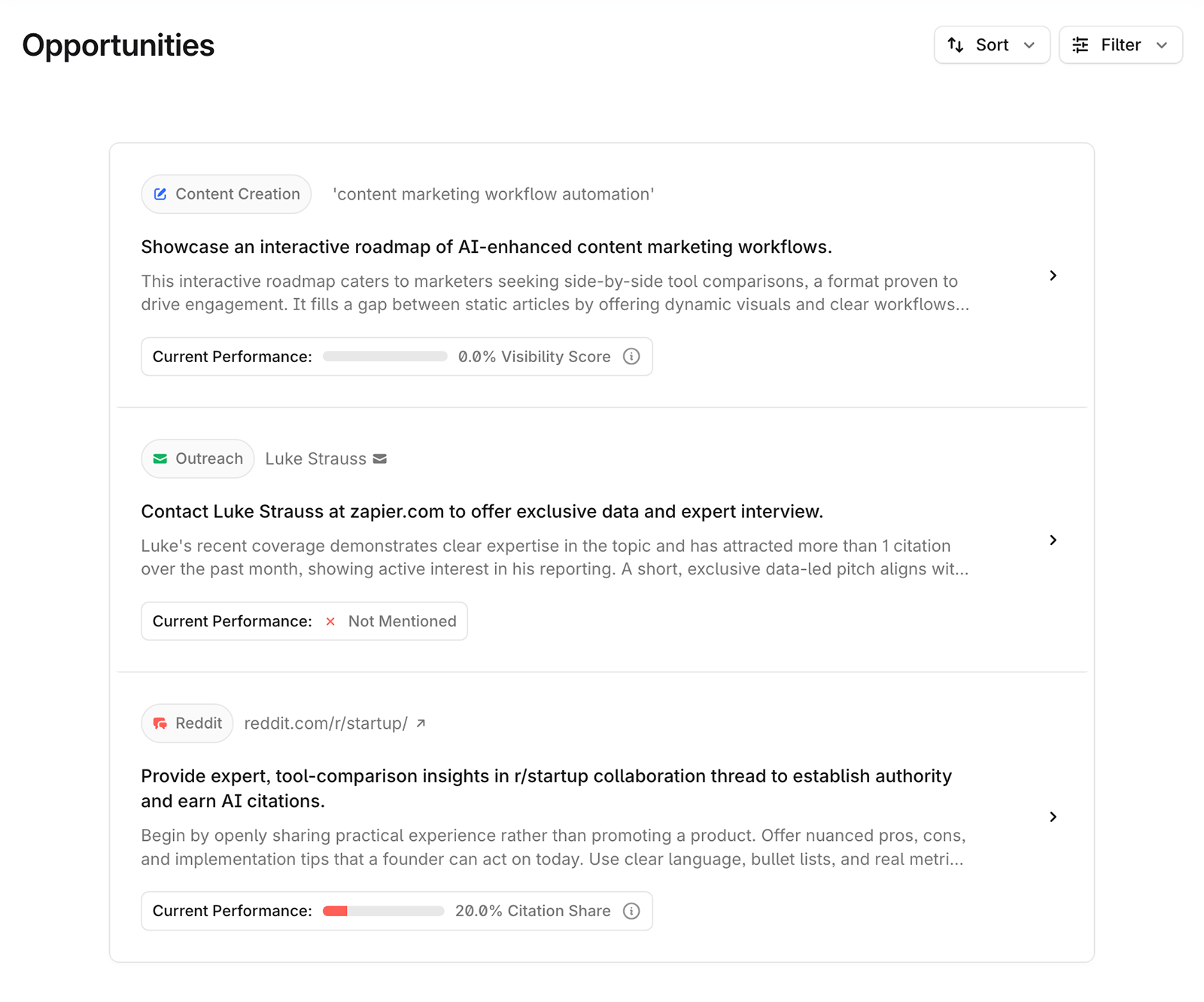
You can click on any of the opportunities to see implementation steps, rationale, and relevant references. This is helpful if you want to understand why you should invest in these opportunities instead of just pursuing them without question.
You can also start working on any content creation opportunities directly in Profound. Select the topic, prompt, brand kit, article title, and answer engines to optimize for. Then, Profound will gather citations, research the topic, and generate an optimized outline.
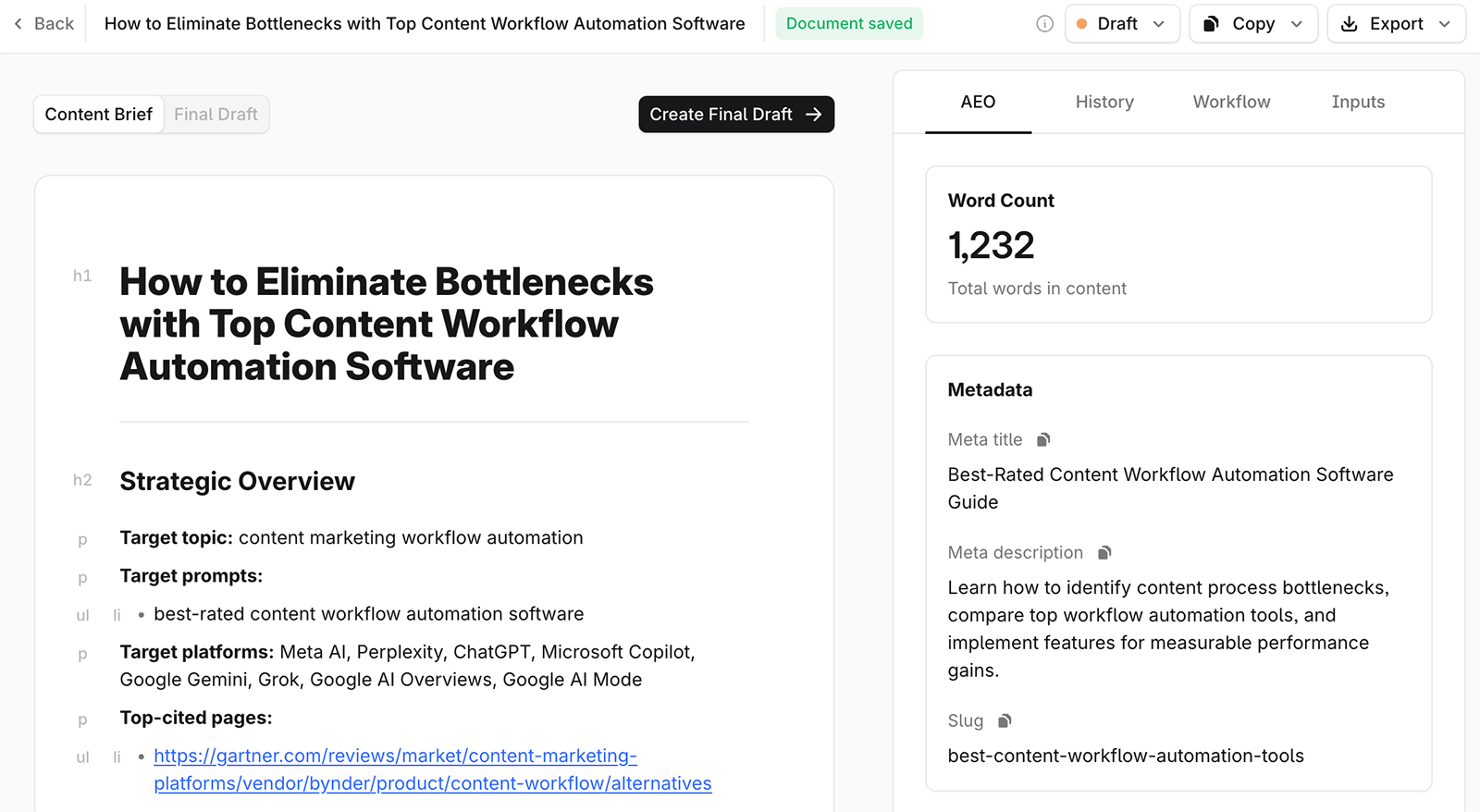
Once you review, adjust, and approve the brief, you can generate the content instantly. Profound uses your guidelines to create content that sounds on-brand and that competes for AI citations.
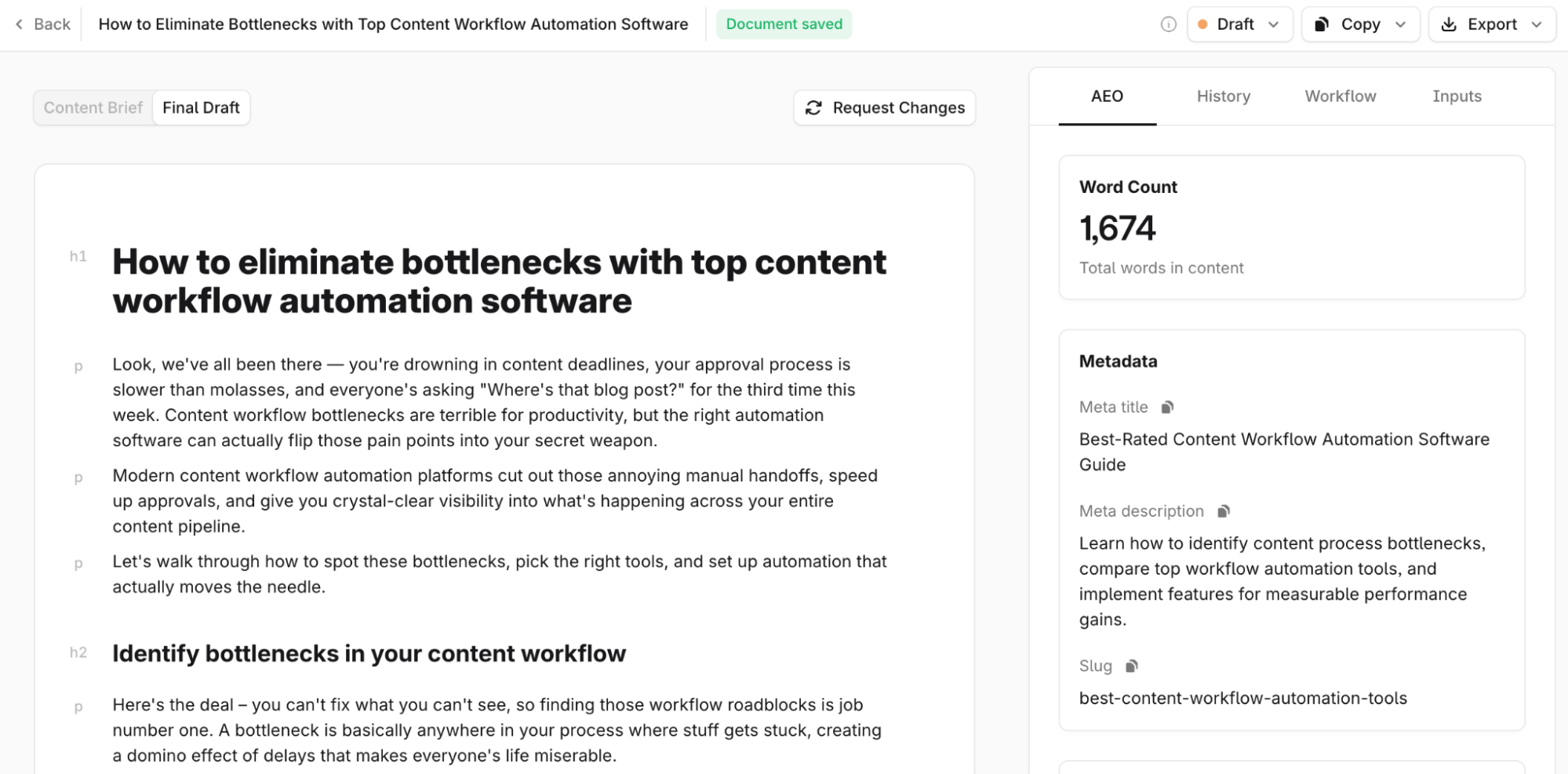
Pricing and subscription options
With a starting price of $295 per month, AthenaHQ’s self-serve plan is in the range of many other AI visibility tools’ mid-tier plans. But the keyword here is “starting price.”
AthenaHQ uses a credit-based system. The self-serve plan includes 3,500 credits per month—but the credits you need add up quickly.
Every AI model you check and each prompt you analyze costs a certain number of credits. Even the prompt analyses cost a certain number of credits, as does enabling Athena’s fan-out capability.
The upside is that you get a lot of flexibility to create the exact plan you need. For example, I set up 10 prompts, opted into all available AI models, and enabled the fan-out option. But that left me with enough credits for weekly prompt analysis only.
So the downside is that if your AI visibility needs exceed what the base 3,500 credits cover, you’ll end up paying much more than the starting price.
While AthenaHQ has an enterprise plan with advanced content optimization, analytics integrations, and a custom number of monthly credits, the platform has no entry-level option. That means your only options are the $295/month self-serve plan or the custom enterprise plan.
In contrast, Profound has three plans to meet a wider range of needs:
- Starter plan ($99/month) that tracks 50 prompts across ChatGPT
- Growth plan ($399/month) that tracks 100 prompts across ChatGPT, Perplexity, and Google AI Overviews and includes AI content generation and optimization
- Enterprise plan (tailored pricing) that tracks a custom number of prompts across 10 AI engines, supports ChatGPT Shopping, and includes AI content generation
What real users say about AthenaHQ
Most AthenaHQ user reviews focus on how the platform helps track visibility and provides content recommendations.
Many users (like this review) also mention how the team is actively building out the platform’s features. This can work if you know what you want from an AI visibility platform and you don’t mind waiting for the team to ship new features. But if you’re looking for a tool that’s ready for prime time, this might not be it.
While users generally have positive things to say about the platform, there aren’t many AthenaHQ reviews to reference. As of writing, the company only has 15 G2 reviews—and it appears in just a handful of Reddit comments.
In contrast, Profound has nearly 10x as many G2 reviews and is mentioned in dozens of Reddit conversations. Reviews often refer to Profound as “best in class” and an “industry leader.”
Reviews like this one discuss how Profound stands out in the category, thanks to its detailed analytics and shopping visibility capabilities.
Giacomo P. (Senior Demand Generation Manager)
“Profound shows me data that is super helpful for my website and helps in understanding the changing landscape of citations and usage over time. Overall, the tool is very strong, and its core functionalities strongly align with my requirements.”
And reviews like this highlight how Profund goes beyond visibility tracking and competitor analysis to provide actionable insights.
Kevin M. (CEO & Co-Founder, Mid-Market)
“It provides actionable insights you won't find elsewhere and helps operationalize strategies around AI visibility. Every action my team takes is based off of the data in this platform.”
How AthenaHQ compares to Profound
Here’s a side-by-side comparison of AthenaHQ and Profound so you can see how the two platforms measure up in terms of features, capacity, and pricing.
When to choose an AthenaHQ alternative like Profound
If you’re looking for an AI visibility tool that gives you the flexibility to build a DIY plan, AthenaHQ could make sense. The platform lets you choose which answer engines to monitor, what prompts and competitors to track, and how often to analyze prompts.
But if your priority is deeper AI visibility analytics, Profound is a smart choice. It offers full analyses for topics, prompts, and citations—so you always know where your brand appears in AI search and how to improve it.
Profound’s granular competitive benchmarking provides visibility rankings for every topic so you know where you’re winning and where to focus your AI visibility efforts next. In addition, Profound’s share of voice metrics reveal which conversations you’re guiding and which need your brand’s attention.
Plus, Profound’s Workflows are designed to create content that answer engines cite and that resonates with your audience. This means Profound can help you generate high-quality content that contributes to your AI visibility goals.
Profound is also a good choice for enterprise users, thanks to its custom data handling, options for cloud or on-premises deployment, and SOC 2 Type II compliance. From Indeed to Docusign and LG to Walmart, the most innovative companies in the world rely on Profound for AI visibility, actionable recommendations, and generative AI tools.
For industry-leading AI visibility—granular competitive insights, strategic analysis, and scalable workflows—Profound delivers. Get started with Profound today.